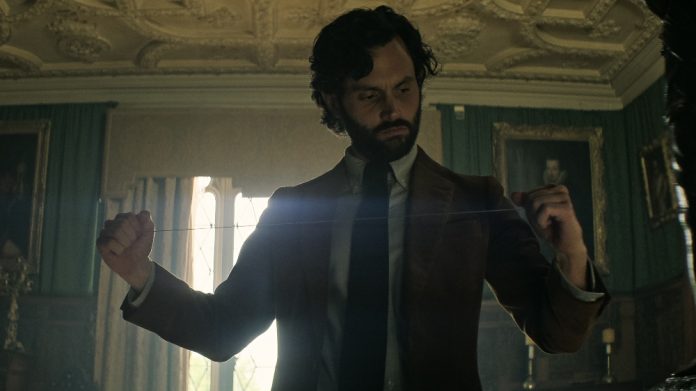If you’re just catching up on You, the psychologically-thrilling whodunit binger, let’s bring you up to speed. Based on the books by Caroline Kepnes, the show was developed by Greg Berlanti and Sera Gamble, a writer-producer best known for her work on the Syfy series The Magicians and the CW series Supernatural, who also serves as showrunner.
The series premiered on Lifetime in September 2018 but found a new home on Netflix for Season 2, which was based on Kepnes’ follow-up novel, Hidden Bodies. Penn Badgley stars as dashing serial killer Joe Goldberg, a hopeless romantic obsessing over the “one,” or in this case, “you,” and his complicated character has become an irresistible fan favorite.
In Season 4, which Netflix split into two parts to keep the audience engaged longer, a bearded Joe has assumed the identity of literary college professor Jonathan Moore, having escaped to London after a brief stint in Paris in the Season 3 cliffhanger, in which he desperately tried to reclaim his love with Marienne (Tati Gabrielle). Unfortunately, having her as the “you” he obsesses over proved to be a non-starter after she discovered his gruesome truth courtesy of Love Quinn (Victoria Pedretti). But as many followers know, there are many more fish in the sea of “yous,” and this season, they’re stuffy aristocratic Brits toward whom Joe/Jonathan gravitates. However, the tables have been turned, as he now becomes the object of someone else’s ego-maniacal obsession.
Above the Line spoke with Sera Gamble via Zoom video from her home in Los Angeles. Occasionally, she would get distracted by her barking dog, but she was gracious and forthcoming when discussing the series, including the decision to bring Joe to London, where Badgley feels at home thanks to his British wife, Domino Kirke.
Gamble’s favorite showrunner duties involve being in the writer’s room, where she says no idea is too crazy… for the most part. Since day one, she and Badgley, who also serves as a producer, have always been on the same page and in sync when it comes to the sex scenes, which are sometimes more campy than sexy, and the violence, which goes for comic relief whenever possible. Now the two of them will have to figure out how to wrap up Joe Goldberg’s story, as Netflix recently renewed You for a fifth and final season.
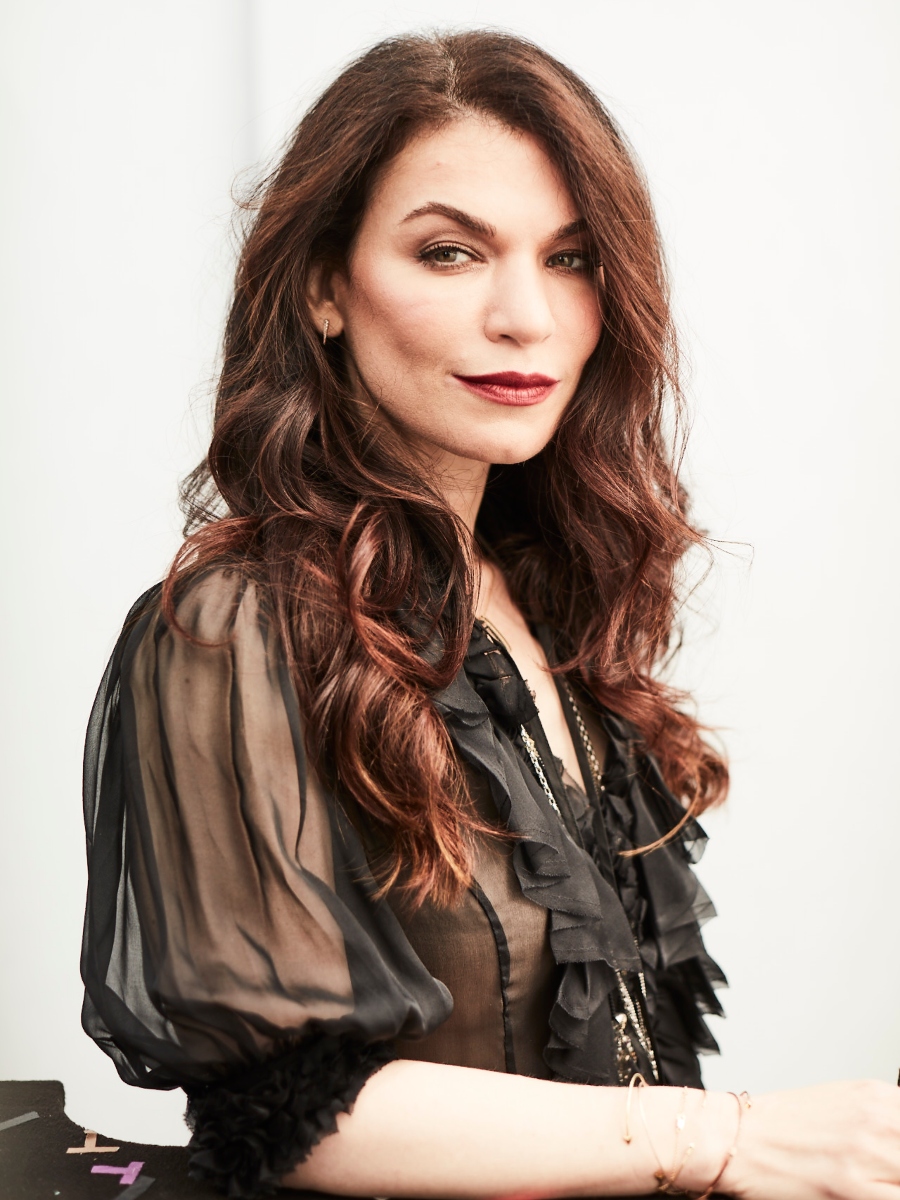
Above the Line: So let’s begin Sera with why you decided to shoot in London. How did that come about?
Sera Gamble: Well, we put him somewhere new each season. We had left him wandering the streets of Paris, and then we had to really figure out the logistics of what Season 3 would be like from there. So first we talked about Paris, but the more we were figuring out the story and then also the more we were researching the realities of shooting, we realized that London was the perfect city.
ATL: So discuss those realities some more. What’s involved with shooting in this kind of location?
Gamble: I mean, these days, TV shows are shot everywhere, and [co-creator] Greg Berlanti’s company makes TV shows like The Flight Attendant, which is kind of all over the world. So luckily, my partners had more experience than I did because I’d never shot anywhere in Europe before. But there were other Warner Brothers shows there. There’s basically more film infrastructure there. I loved shooting in Paris. We did get to go there a little bit for the first episode of Season 4, but it [London] was sort of like a home that was a little bit pre-built for us. At the same time, the more that we talked about the kinds of rich, clueless people we wanted to put him around, the more we realized that the kind of burning epicenter of that idea, from an American perspective, [would be] British aristocrats.
ATL: Did Penn’s wife, Domino Kirke, lend any input, given that she is British?
Gamble: No, but I know that he had relatives there, so that was nice. I mean, Penn always says that when he goes off to shoot the season of the show, it’s almost like a monk-like experience because he’s doing nothing but working for several months. So I was personally happy that he would be surrounded by more family and friends.
ATL: That’s great. So let’s talk about this British cast. What were you looking for as you assembled this ensemble of attractive characters?
Gamble: Each character has its own special ridiculous sauce. When you’re writing a whodunit, you’ve created all the characters who you think could murder somebody; all of them have to be viable options. But beyond that, we kind of like to be surprised, and we like to work with casting directors who enjoy bringing in fresh actors — actors they’re passionate about — who might not exactly fit the bill but who they can kind of advocate for.
We work with Sophie Holland, who just did an amazing job of presenting us. Listen, it’s not like London is hurting for good actors; famously, they’re all right over there. But she just brought us such interesting, cool people. It was hard to see a bad audition, honestly, for any of those roles.
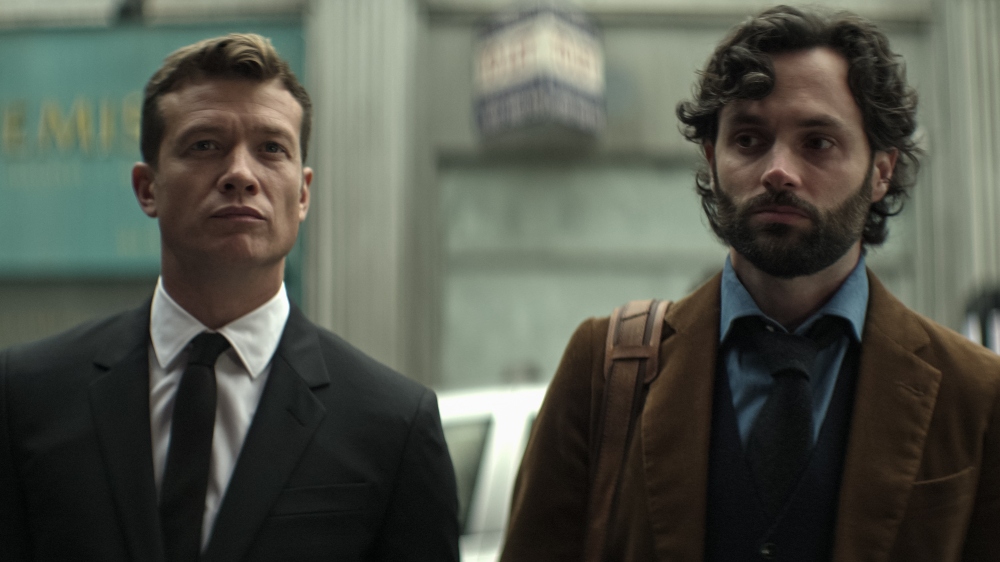
ATL: Who was the biggest surprise for you in terms of the cast?
Gamble: You know, that’s a great question that I don’t have an amazing answer for because they’re all so fabulous. [chuckles] I will say that Ed Speleers (Downton Abbey, Outlander), who plays Rhys, when you see him in Episode 1, you kind of have no idea of what he’s going to be like by the time you get to Episode 7 or 8. I was familiar with his work, and he had played a couple of those scenes in his auditions. But when he landed on set on the day to do those scenes, he just brought out colors that were just astonishing.
Like the platonic ideal of producing a show, you’re going to be in post-production and working with the editor, and they’re going to show you a scene, and you’re going to be like, ‘I love it. Just little trims.’ And then they’re going to be like, ‘But I want you to see these other takes because they’re also good.’ Then you just can’t pick between them. It doesn’t happen that often, but with Ed, it happens a lot.
ATL: In reading about you, I found that in many ways you are just as elusive as Joe Goldberg. What you do have in common is that you’re both Jewish. Is he the first Jewish serial killer on television?
Gamble: [laughs] I’m just boring. He’s half-Jewish, but yeah, that was his name in the book. Caroline Kepnes, the book’s author, does mention that his father was Jewish and his mother was Catholic. I believe in the books that it’s kind of the same as the character Peach Salinger, that they have a similar kind of religious makeup in their childhood home. I thought it was kind of interesting because it hadn’t occurred to me that there wasn’t much representation of Jewish people in the serial killer community. That’s a silly thing to talk about; we’re a small part of the population, and therefore we’re a small percentage of serial killers. That’s going to be my default assumption about Jewish serial killers. This is a funny statement that I make a lot when talking about the show. If you put the murder aside for a minute, the lead of the show, the romantic lead of the show being like a play on the “nice Jewish boy” [stereotype] was really fun to write.
ATL: What’s more intimate for Penn and the rest of the actors — the show’s sex scenes or its murder scenes?
Gamble: There are two ways to answer that question. One is purely technical. It’s about how we shoot the show, and that’s really what Penn was talking about when he came to me about the intimacy scenes. It was very much about the fact that physical contact with another person in an intimate way is what intimacy can be. That’s what we were talking about. My first question to him was, ‘Is this about the content of the show or your comfort level as a performer with what’s happening to your actual body?’ And he made it clear that he wasn’t taking exception to anything in particular about the show. He wasn’t asking me to rewrite anything about the story.
So that being said, I feel like, for the most part, we’re kind of like a cheeky sex-positive show when we’re doing sex scenes. I mean, it’s not about tortured, repressed sexual expression. We explore people with different kinds of kinks, like a happy couple who swing. The sex parts are actually one of the lighter parts of the show. The murder [laughs] is really where we dig deep. Sometimes it’s funniest to me how, if the word “sex” is in a quote or a headline, everyone will want to talk about it. But I mean, we’re talking about a show where in Episode 1 of the season, we chopped up a naked guy in a sawmill to a Cardi B song. I feel like that is crazier. You know, 30 seconds of that scene are crazier than anything — quote, unquote — sexual that has happened in four seasons.
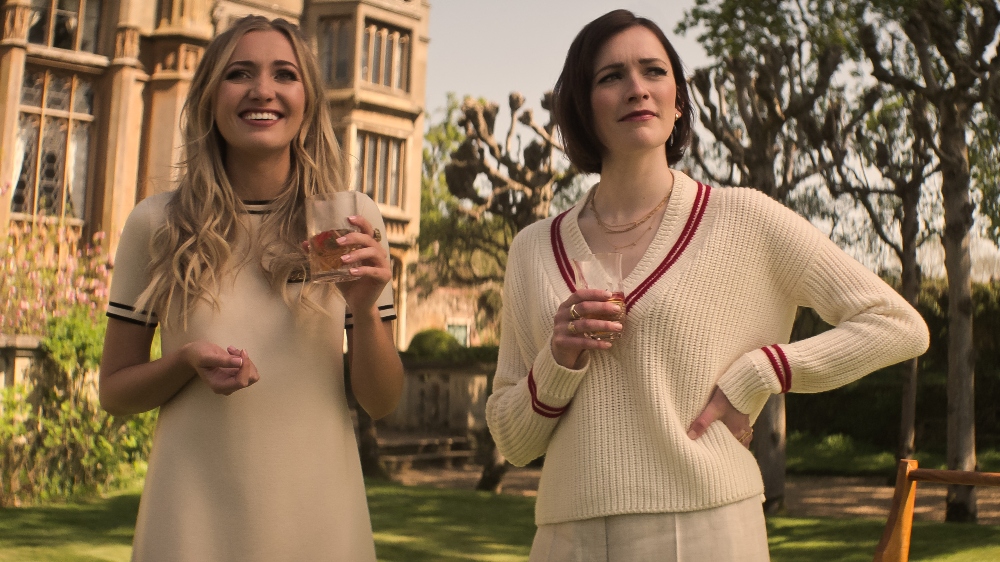
ATL: Do you have more fun writing the murder scenes than the rest of the show?
Gamble: I do enjoy writing gore, I have to say. It depends on the project. There are certainly stories where the violence is really serious and visceral, and I have written scenes like that where I feel like people are really getting hurt. That’s difficult because it’s no different than writing any other really emotionally harrowing scene. But on our show, there’s something a little, almost, comedic about it, frequently, whereas the sex is usually kind of torture for Joe. He’s had some erectile problems over the history of the show. He’s fallen in and out of love with his significant other. Like, that stuff’s hard. But when he’s being beaten up and then throwing somebody off the roof of a parking structure, it’s almost like we’re in semi-clown territory somewhere.
ATL: Is there a barometer that you go by where certain ideas coming out of the writer’s room will just never fly?
Gamble: Usually, when someone pitches something and I’m a little scared of it or have that kind of dubious knee-jerk reaction, that’s my cue not to say anything for a minute and to just let the crazy idea live in the writer’s room because the best stuff comes out of that. We’re pretty clear that there’s probably no story too crazy for this show. Our job is really to keep the characters grounded so you recognize them as humans.
You know Joe, he’s twisted. He’s moderately to severely unhinged, but he does act like a person. As long as Joe and the relationships that he’s having feel familiar to you, we can’t jump the shark. We are the shark. It’s such a fun room. Those are the days where I’m like, “I can’t believe I get paid for this” because I’m just in a room with these smart, funny people, all of whom are pulling up the craziest references. We’re watching stuff on YouTube, we’re gossiping, and somehow, at the end of the day, we’ve figured out half an episode.
In the moment, when the synergy happens and an amazing idea is cooked up, watching it ping pong between people and grow and form and take shape, it’s just bliss to be in the flow of creativity with a bunch of people. I’ve somehow tripped my way into a job where I get to feel like that a lot over the course of a season. I would compare it to a drug. I mean, it feels incredible while it’s happening.
For those of us who’ve been sort of writing stories since we were little, there’s just something crazy about the fact that I can be sitting on my couch with my obnoxious dog in the morning and just type some stuff and send it in, and then a few weeks later I’ll be standing on a beach and there will be 150 people bringing that exact thing to life. It’s a nice job if you can get it.
ATL: Are you and Penn usually on the same page in terms of how far the character will go?
Gamble: When we were prepping for this, we had him test costumes, and we talked through some moments, and he was worried about a couple of them, [and] rightly so. And we realized that we were both feeling the same thing about that edge we were walking on. So sometimes that’s kind of what happens with Penn. He’ll just be getting up every morning and doing his job for 15 hours a day, and we won’t talk for a couple of weeks, and then he’ll call me, and it’ll be the same thing I’ve been kind of ruminating on. So that’s, like, my sign that I have to go back and look at those pages again.
ATL: As a showrunner, what would you say is your favorite department to liaise with?
Gamble: I’m kind of a kid in a candy store. There are so many. It’s like you write something, and then — an example from this season is — you get an email and you open it, and it’s all penis candles. “Do you want to approve the penis candles?” [So] the props [are] hilarious. The SetDec is amazing. I really enjoy costumes. I’ve always been a lover of fashion as an art form. I just like working with people who are brilliant in that area.
We had fantastic costume designers this season who really took things to the next level. A lot of times, if you just hire the right person, you don’t have to do much. You just have a fun, creative conversation, and they go and do something you never even would’ve dreamed of.
This is really going to reveal the contours of my control freakishness, but it’s impossible to do it perfectly. It’s really even impossible to score above 90 percent as a showrunner because there are too many jobs that all fall under that umbrella. The longer I do it, the more peace and acceptance I have about the fact that I’m sort of constantly juggling 13 plates at the same time and something will fall every now and again.
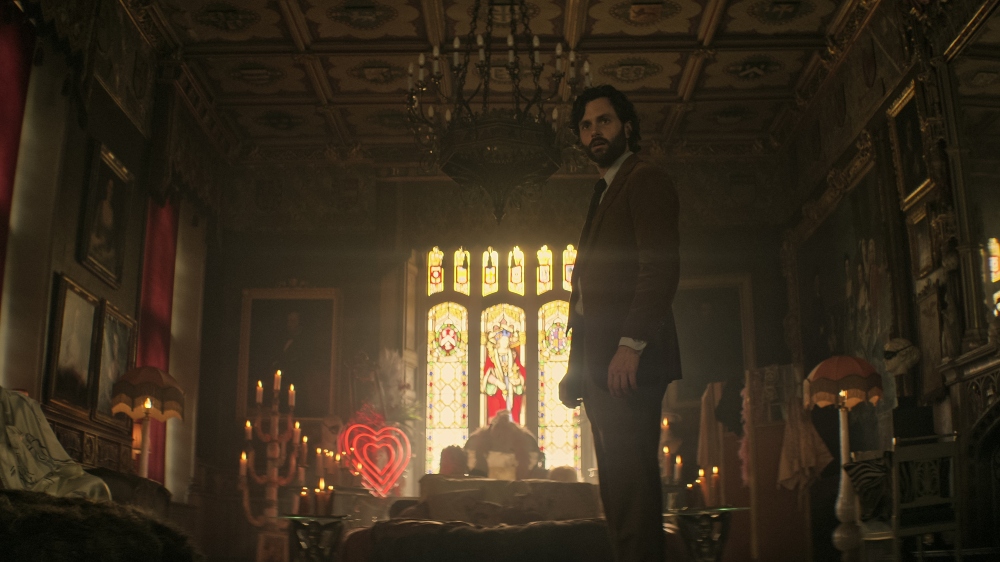
ATL: Let’s talk about the fans. How do you feel about their response to the show?
Gamble: What is cool is what happens, like, on Halloween. When Season 3 dropped, I was tagged in all of these photos on Twitter and Instagram of couples who were dressed as Joe and Love. They’re kind of perfectly suited for a Halloween costume because they have, like, a couple [of] iconic things, but you have those things basically in your kitchen. Maybe it’s because I kind of grew up as a TV writer, writing on fantasy shows and going to Comic-Con, so to me, the ultimate compliment is the cosplay.
ATL: Looking back, how has the show changed and evolved since Season 1?
Gamble: It’s changed a lot. I mean, I never, ever assume a show will go longer than one season. I just live in a world where the show is about to be canceled. Cancellation looms at all times because I feel like any other attitude is just kind of arrogant. That’s not how TV works. They’ll pull the rug out from under you with no warning. The good thing about having that kind of mindset is that if we have an idea, we just do it. We don’t wait.
The only exception is what happens in the second half of Season 4. We started talking about that in Season 2, more or less, and we knew it wasn’t the time. This season is probably the biggest example of the story that we’ve been cooking, pretty much for the life of the series, and finally got to [do]. I don’t think it should go on forever. That’s not the intent of the show. The intent is to complete the arc of Joe Goldberg and then be done. It goes back to the whole “never assume you have another season thing.” I’ll just say there’s a great idea for Season 5…
ATL: Did you always imagine Season 4 as a two-parter?
Gamble: No, when we broke the season and started writing the episodes, we thought they would all drop at the same time, as in previous seasons. And then Netflix called and said, ‘You know, we’re trying this thing. What are your thoughts?’ Because the season split so cleanly, with “Whodunit” being the first five episodes and “Serial Killer Buddy Movie” being the second half of the season, we thought this was a kind of ideal situation.
I mean, the only downside is that people have time to think and theorize, and a few more people will stumble onto the exact story we’re going to tell. By and large, it’s nice to drop a TV show in pieces so that people can talk about it a little longer versus just saying, “Here it is,” and then you have one weekend to watch it.
ATL: What is it about you that’s so fascinated with the horror genre and the macabre?
Gamble: Something that puzzles me is that when I started writing scripts, I thought I was going to be a comedy writer. It seems so strange to me now. You know, I walk around always wondering what people are hiding. For my whole life, I’ve been like that. If I’m standing in line at Starbucks, I’m probably low-key trying to figure out the secret horrors and the lives of the people who are waiting to pick up their coffee. I’m kind of obsessed with the truth that we can never really know another person. I don’t know if we pick our fears or [if] they get instilled [in us] or something. I don’t know; it happened to me before I could even speak. Right?
Maybe I saw something tragic as a baby and now I’m a TV writer! But it’s intensely therapeutic and calming to me to set up that sort of situation and write my way through it to the end. It feels like I’ve unpeeled the layers of someone and gotten to actually peer inside of them. We don’t get to do that as much in life, but at least I get to do it on the page. I mean, I sleep great. The more people get chopped up in the script during the day, and the more nice boys who just want to date you turn out to be horrible serial killers that day, the more I’m just happy falling asleep at 9:30 p.m. and having great dreams.
Season 4 is now streaming in its entirety on Netflix.


